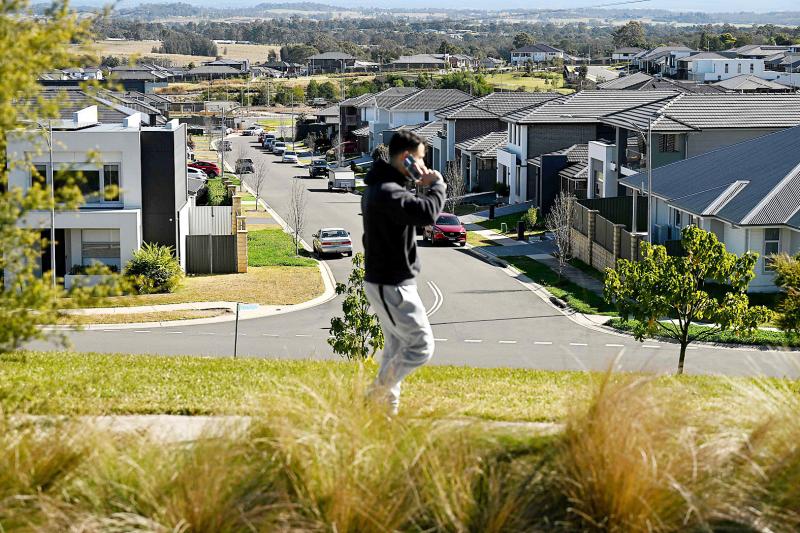The Reserve Bank of Australia (RBA) yesterday boosted its benchmark interest rate for a fourth consecutive month to a six-year high of 1.85 percent.
The Australian central bank’s decision was the cash rate’s third consecutive hike of half a percentage point.
When the bank lifted the rate by a quarter percentage point at its monthly board meeting in May, it was the first rate hike in more than 11 years.

Photo: AFP
The cash rate is now at its highest point since May 2016, when the bank cut the rate to 1.75 percent from 2 percent.
RBA Governor Philip Lowe said his board “places a high priority on the return of inflation” to a target range of 2 to 3 percent “over time, while keeping the economy on an even keel.”
“The path to achieve this balance is a narrow one and clouded in uncertainty, not least because of global developments,” Lowe said in a statement.
Yesterday’s hike was widely anticipated after official data released last week showed inflation in the year through June was 6.1 percent, up from 5.1 percent in the year through March.
Inflation only increased by 3.5 percent during the last calendar year.
Treasurer of Australia Jim Chalmers said the latest rate rise would create more financial hardship for families who are already contending with higher grocery and power prices.
“This decision doesn’t come as a surprise. It’s not a shock to anybody, but it will still sting,” Chalmers told Parliament.
Lowe is under mounting criticism over his forecast in November last year that the cash rate would remain at a record low 0.1 percent until 2024, despite COVID-19 pandemic-induced inflation.
Warren Hogan, a former economic adviser to a previous Australian government and chief economist at Australia and New Zealand Banking Group Ltd and Credit Suisse Group AG, said Lowe had misled borrowers into taking on more debt than they should have.
Overextended first-home buyers were “staring down the barrel of the most significant tightening of monetary policy in the modern era,” Hogan told Australian Broadcasting Corp.
“I can’t see how much bigger an error a central bank and its board can make and it’s all about the credibility of the institution,” Hogan said, referring to the forecast of continuing low interest rates.
The government last month announced a wide-ranging review of the bank and monetary policy.
Australian home prices were falling at the fastest pace since the global financial crisis in 2008 and market conditions were “likely to worsen” as interest rates continue to rise, adding to costs for home buyers, property analytics firm CoreLogic Inc reported on Monday.

Among the rows of vibrators, rubber torsos and leather harnesses at a Chinese sex toys exhibition in Shanghai this weekend, the beginnings of an artificial intelligence (AI)-driven shift in the industry quietly pulsed. China manufactures about 70 percent of the world’s sex toys, most of it the “hardware” on display at the fair — whether that be technicolor tentacled dildos or hyper-realistic personalized silicone dolls. Yet smart toys have been rising in popularity for some time. Many major European and US brands already offer tech-enhanced products that can enable long-distance love, monitor well-being and even bring people one step closer to

Malaysia’s leader yesterday announced plans to build a massive semiconductor design park, aiming to boost the Southeast Asian nation’s role in the global chip industry. A prominent player in the semiconductor industry for decades, Malaysia accounts for an estimated 13 percent of global back-end manufacturing, according to German tech giant Bosch. Now it wants to go beyond production and emerge as a chip design powerhouse too, Malaysian Prime Minister Anwar Ibrahim said. “I am pleased to announce the largest IC (integrated circuit) Design Park in Southeast Asia, that will house world-class anchor tenants and collaborate with global companies such as Arm [Holdings PLC],”

TRANSFORMATION: Taiwan is now home to the largest Google hardware research and development center outside of the US, thanks to the nation’s economic policies President Tsai Ing-wen (蔡英文) yesterday attended an event marking the opening of Google’s second hardware research and development (R&D) office in Taiwan, which was held at New Taipei City’s Banciao District (板橋). This signals Taiwan’s transformation into the world’s largest Google hardware research and development center outside of the US, validating the nation’s economic policy in the past eight years, she said. The “five plus two” innovative industries policy, “six core strategic industries” initiative and infrastructure projects have grown the national industry and established resilient supply chains that withstood the COVID-19 pandemic, Tsai said. Taiwan has improved investment conditions of the domestic economy

MAJOR BENEFICIARY: The company benefits from TSMC’s advanced packaging scarcity, given robust demand for Nvidia AI chips, analysts said ASE Technology Holding Co (ASE, 日月光投控), the world’s biggest chip packaging and testing service provider, yesterday said it is raising its equipment capital expenditure budget by 10 percent this year to expand leading-edge and advanced packing and testing capacity amid strong artificial intelligence (AI) and high-performance computing chip demand. This is on top of the 40 to 50 percent annual increase in its capital spending budget to more than the US$1.7 billion to announced in February. About half of the equipment capital expenditure would be spent on leading-edge and advanced packaging and testing technology, the company said. ASE is considered by analysts